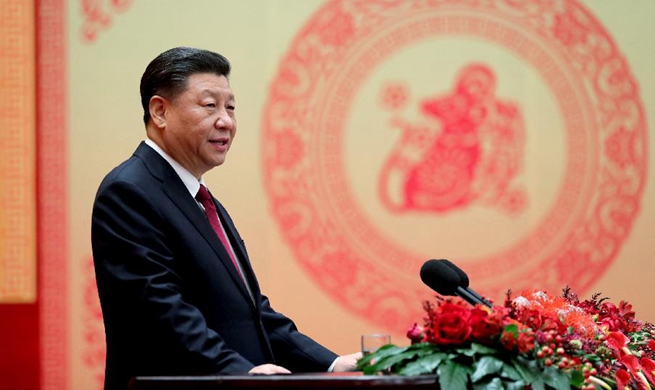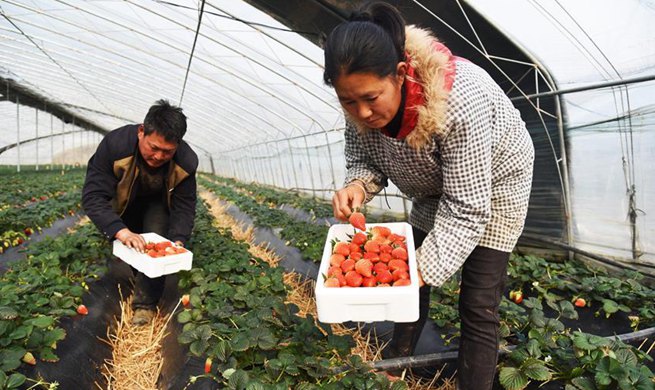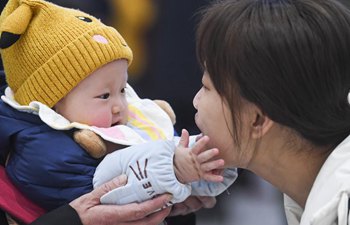UNITED NATIONS, Jan. 24 (Xinhua) -- Education Cannot Wait (ECW) on Friday appointed former United Nations Educational, Scientific and Cultural Organization (UNESCO) Director-General Irina Bokova and former European Commissioner for Humanitarian Aid and Crisis Management Christos Stylianides as ECW global champions for education in emergencies.
"As the Decade of Action to achieve the Sustainable Development Goals by 2030 kicks off, the two new global champions will support the growing global movement to deliver quality, inclusive education to more than 75 million children and youth worldwide that are missing out on the hope, opportunity and protection of an education as the result of protracted crises and emergencies," Yasmine Sherif, director of ECW, the first global fund dedicated to education in emergencies and protracted crisis, said at a press conference held at the UN headquarters in New York on the International Day of Education, which falls on Jan. 24.
"I am delighted that Irina Bokova and Christos Stylianides have accepted to serve in the important advocacy role of 'ECW global champion for education in emergencies.'" said Gordon Brown, UN Special Envoy for Global Education, in a press release.
"They will be great assets to our shared cause for the United Nations and the 75 million children and youth around the world whose education is disrupted by crises," he added.
As the 9th director-general of UNESCO and the first woman to head the agency, Bokova is a staunch advocate for quality education, gender equality, women's empowerment and sustainable development.
UNESCO is a key partner for ECW's educational responses, which have already delivered education to over 2 million children and youth in some 30 countries affected by crises.
"Education Cannot Wait is a pioneer of the big efforts to provide education to the 75 million children and youth whose education is disrupted by crises. I am, therefore, very proud to be an active advocate and supporter of ECW's admirable work," said Bokova at the press conference.
"Despite the progress, big challenges remain. Joining forces is key to tackle them effectively. It is our moral duty to help children around the globe get the education they deserve," she added.
As the European Commissioner for Humanitarian Aid and Crisis Management, Stylianides was a key proponent of the European Union (EU)'s groundbreaking decision to devote 10 percent of its humanitarian assistance to education. The EU has already committed 24.7 million U.S. dollars to ECW, and a number of EU member states are key donors to the fund.
"Indeed, education cannot wait until a conflict is over, until buildings have been rebuilt, until resources are available. Education is the best, long-term way to break the cycles of violence and poverty and set communities on the path to peace and development," said Stylianides at the press conference.
With the support of its global champions and key partners in national governments, UN agencies, philanthropic foundations and donors, ECW seeks to mobilize 1.8 billion dollars by 2021 to support education programs for children and youth caught in the world's worst humanitarian crises, according to the press release.
The fund has already raised over half a billion dollars in its first three years of operation and plays an instrumental role in strengthening the coherence between short-term humanitarian assistance and medium to long-term development interventions in the education aid sector.
ECW is rapidly scaling up its investments to support quality learning outcomes for vulnerable girls and boys in crises, said the press release.
In the Sahel countries of Burkina Faso, Mali and Niger, education is "deliberately being targeted" by non-state armed individuals and groups, including the killing of school personnel and the destruction and looting of school facilities and threats to communities that have forced the closure of hundreds of schools.
Also in Brazil, Colombia, Ecuador and Peru, half of the refugee and migrant children from Venezuela are not enrolled in formal schooling, putting them at greater risks of child labor, gender based-violence, sexual exploitation and trafficking, said the press release.
The worsening situation in Venezuela has pushed over 4 million Venezuelans to flee the country, a majority of whom are families with children. An estimated 1.2 million children and youth are affected in Brazil, Colombia, Ecuador and Peru alone, according to the press release.
In Yemen, 12 percent of the population is displaced after nearly four years of conflict, 4.7 million children need humanitarian assistance to ensure the continuation of their education. Across the country, 2 million children are out of school. Girls are more likely to lose out on education, with 36 percent out of school compared to 24 percent of boys.
In Uganda, the largest refugee hosting country in Africa, more than 1.2 million people have sought refuge from the crises in South Sudan and the Democratic Republic of the Congo.
ECW's Education Response Plan aims to reach almost 600,000 affected children with quality education. At the start of the 2020, 22 million dollars has been mobilized, but 89 million dollars is urgently required for full implementation of the plan.
ECW, hosted by the UN Children's Fund (UNICEF), was launched by international humanitarian and development aid actors, along with public and private donors, to address the urgent education needs of 75 million children and youth in conflict and crisis settings.

















